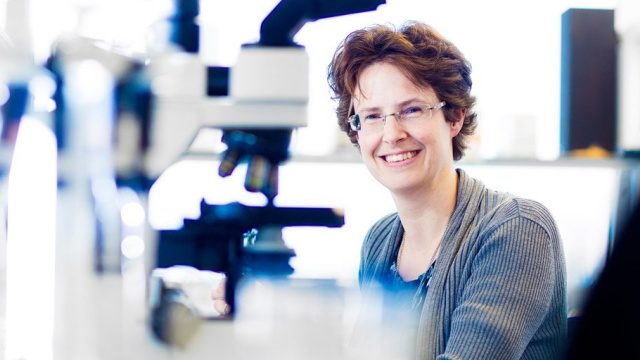
Our Focus
Through mechanistic understanding of the crosstalk between the immune system and cancer cells, we aim to contribute to the design of novel immunomodulatory strategies to fight metastatic breast cancer. Our main research questions:
Understanding the crosstalk between breast cancer and the immune system and how this contributes to immune escape
We study how tumours shape the immune landscape and how this impacts disease progression. We focus on how the genetic makeup of breast cancer dictates the interaction with the immune system and immunotherapy response, with the aim to move towards personalized immune intervention strategies (Van Weverwijk & De Visser, Nature Reviews Cancer 2023). Moreover, we aim to dissect how tumours induce systemic immunosuppression and how this influences organ-specific metastatic spread.
How can we maximize the therapeutic benefit of immunomodulatory treatment strategies for breast cancer
Using clinically relevant mouse tumour models and by collaborating with medical oncologist Marleen Kok (NKI/AVL) and Oncode PIs, we aim to enhance the success of immunotherapy for cancer by alleviating tumour-induced immunosuppression and engaging specific myeloid immune cell subsets. Our patient immunomonitoring program (flow- and omics-based) (Bakker et al. in press 2024) complements fundamental research in genetically engineered mouse tumour models. For instance, we found that eosinophils enhance immunotherapy response in breast cancer (Blomberg et al. Cancer Cell 2023).
About Karin de Visser

Karin de Visser
My Research
Dr. Karin E. de Visser obtained her PhD at the Division of Immunology at the Netherlands Cancer Institute in Amsterdam in the field of tumor immunotherapy. From 2003-2005 she worked as a postdoctoral fellow of the Dutch Cancer Society in the lab of Dr. Lisa Coussens in the Cancer Research Institute at the University of California, San Francisco, where she developed an active interest in the interplay between adaptive and innate immune system during cancer development. She discoverd a novel promoting role for B lymphocytes during inflammation-associated skin carcinogenesis.
In 2005 she joined the laboratory of Dr. Jos Jonkers at the Division of Molecular Biology at the Netherlands Cancer Institute, where she expanded her research direction into the field of inflammation and mammary carcinogenesis, using conditional mouse models. Currently she is group leader at the Division of Immunology at the Netherlands Cancer Institute. The overall goal of her research is to understand by which mechanisms the immune system influences breast cancer metastasis and response to conventional anti-cancer therapies. Through mechanistic understanding of the crosstalk between the immune system and cancer cells she aims to contribute to the design of novel immunomodulatory strategies to fight metastatic breast cancer and to increase the efficacy of anti-cancer therapy response.
A recent breakthrough of her lab is the discovery that mammary tumors induce a systemic inflammatory response involving γδT cells and neutrophils to facilitate metastasis formation (Coffelt et al. Nature 2015). Karin de Visser received a prestigious ERC consolidator grant in 2014, she is recipient of the 2015 Metastasis Research Prize of the Beug Foundation and in 2016 she was selected as a member of the EMBO young investigator program. Please have a look at her website for more information.
Awards
2017: Invited member of The Academy of Europe (Academia Europaea)
2016: Selected as an EMBO Young Investigator (EMBO YIP)
2015: The Metastasis Research Price for advanced researchers of the Beug Foundation for Metastasis Research
2014: ERC consolidator grant laureate
2009: NWO-VIDI laureate
2009: NWO/Aspasia award: career advancement award of the Innovational Research Incentives Scheme of NWO.
2003: AACR-Women in cancer research Brigid G. Leventhal Scholar-in-Training Award for participation in the 94th AACR Annual Meeting, 2003.
2003-2005: Dutch Cancer Society (KWF) fellowship for fundamental and (pre)-clinical cancer research
Key Publications
Ciampricotti, M., Hau, C. S., Doornebal, C. W., Jonkers, J., & De Visser, K. E. (2012). Chemotherapy response of spontaneous mammary tumors is independent of the adaptive immune system. Nature medicine, 18(3), 344.
Coffelt, S. B., Kersten, K., Doornebal, C. W., Weiden, J., Vrijland, K., Hau, C. S., ... & de Visser, K. E. (2015). IL-17-producing γδ T cells and neutrophils conspire to promote breast cancer metastasis. Nature, 522(7556), 345.
Coffelt, S. B., Wellenstein, M. D., & de Visser, K. E. (2016). Neutrophils in cancer: neutral no more. Nature Reviews Cancer, 16(7), 431.
Doornebal, C. W., Klarenbeek, S., Braumuller, T. M., Klijn, C. N., Ciampricotti, M., Hau, C. S., ... & de Visser, K. E. (2013). A preclinical mouse model of invasive lobular breast cancer metastasis. Cancer research, 73(1), 353-363.
Kersten, K., Coffelt, S. B., Hoogstraat, M., Verstegen, N. J., Vrijland, K., Ciampricotti, M., ... & Doshi, P. (2017). Mammary tumor-derived CCL2 enhances pro-metastatic systemic inflammation through upregulation of IL1β in tumor-associated macrophages. Oncoimmunology, 6(8), e1334744.
Members
| Karin de Visser Group leader, Division Imunnology | Annemieke Bouwman Phd student | Antoinette van Weverwijk Postdoc fellow |
| Beatriz Soares PhD | Cheei-Sing (Tisee) Hau Technician | Daniil Anastasopoulos Phd Student |
| Elham Beyranvand Nejad Postdoc fellow | Irene Querol Velilla Phd student | Jelle van Schooten Postdoctoral fellow |
| Jinne Pruijs PhD student | Kim Vrijland Technician | Tom Langelaar PhD |